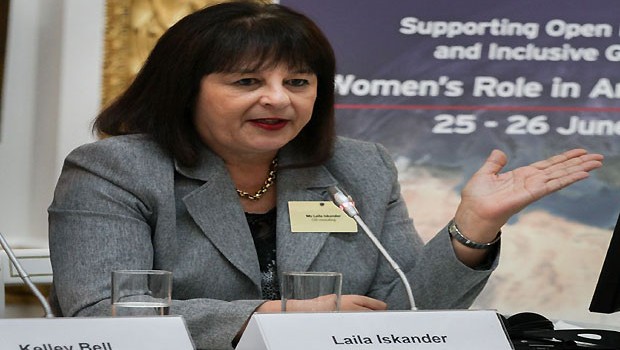
Leila Iskander, an Egyptian social entrepreneur and consultant, takes part in a panel at the G8 Deuville conference in London on June 26, 2013. (Asharq Al-Awsat/James Hanna)
The two-day G8 Deauville Partnership: Women in Business conference, held at Lancaster House, brought together panels of politicians, business owners and founders of charitable organisations and social enterprises focused on economic growth in the Middle East and North Africa (MENA). The event aimed to look at the various ways of unlocking opportunities for Arab women in the business world.
Speakers included Cherie Blair, QC, Minister of State of the UAE H.E. Dr. Maitha Salem Al-Shamsi, Laila Iskander, a board member of CID consulting and winner of the SKOLL Award for Social Entrepreneurship, and the UK minister of state for trade and investment, Lord Green.
Lord Green stated that “a huge, untapped reservoir of talent and energy lies in women and we really cannot afford to ignore it any longer.”
“We would be foolish to think that women don’t face particular challenges as entrepreneurs,” stated Cherie Blair. “This is a problem in every part of the world.”
However, the conference focused on the particular challenges faced by women in the Middle East.
The importance of entrepreneurship and its role in economy-building was one of the main topics running through the discussions. “Investing in women’s economic participation is the smart thing to do,” stated UK secretary of state for international development Justine Greening. “It’s about unlocking the economic potential of countries, particularly at a time when many countries see unemployment rising and growth falling under pressure.”
Blair acknowledged that some of the obstacles faced by Arab women in the world of business lay in the countries’ legal frameworks; however, she also recognised that the informal barriers are often harder to remove.
Tunisia’s only female minister, Sihem Badi, noted that in May 2011 an equality law was passed in her country. “Today, we have 28 percent of women participating in writing the constitution following the revolution. This is because of the imposition of the election laws,” she said. She added that “the law on its own is not enough,” noting that “there has to be education, the culture of equality and non-discrimination on the basis of gender”
Ouided Bouchamaoui, the first female president of the Tunisian Confederation of Industry, Trade and Handicrafts, discussed entrepreneurship among Tunisian women. She stated that despite the large number of women in higher education in Tunisia, few women take the initiative to set up their own companies and projects. Bouchamaoui recommended that to encourage entrepreneurship, the “circle of cooperation” should be widened and not be limited to government and public institutions.
Reem Badran, the vice-chair of both Amman’s and Jordan’s Chambers of Commerce, highlighted the importance of having women on the boards of companies and involved in international trade agreements. “We are part of the community; we are not outsiders,” she stressed, in reference to the cultural barriers that often obstruct women from participation in trade in the MENA region.
Jordanian minister for social development Reem Abu Hassan spoke of high rate of education versus low rate of working participation in her country. She also acknowledged positive developments in the establishment of a fund to support maternity leave in Jordan and an amendment to the personal status law that ensured more rights for women in the family. She emphasized that “the reality of lives of many women requires that there should be an intervention by the state, otherwise the cultural norms and traditions would never allow the women to reach her potential.”
The focus of the second day of discussions was on Arab women’s role in trade and investment. The Rt. Hon. Baroness Symons and the Minister of State of the UAE, H.E. Dr. Maitha Salem Al-Shamsi, opened the session. Dr. Al-Shamsi encouraged the assembled delegates to “nurture the ambitions of women” in the MENA region.
The conference was successful in providing a forum for networking among Arab business women from across the Middle East. However, it has yet to be seen whether the discussions will translate into real change on the ground.
